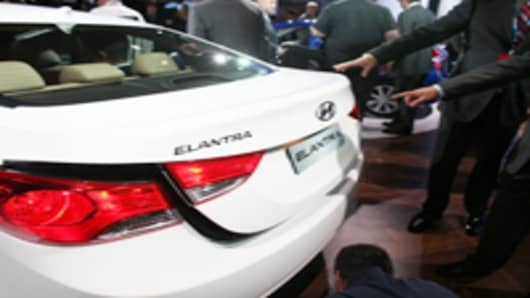South Korean automakers Hyundai and Kia are looking to boost sales by positioning themselves as quality brands in a slowing China car market, where the low end is getting "too crowded,” analysts tell CNBC.
The two affiliated car manufacturers want to be known as “better brands” than their domestic competitors and are pitching themselves a notch higher, James Chao, Director of Asia Pacific research at IHS Automotive Consulting, told CNBC.
"The low end is dominated by locals, it's too crowded. Hyundai is positioning above that. Because of their (Kia and Hyundai) products, they have demonstrated on a worldwide basis that they can do well in some of the most competitive markets,” Chao said.
In Europe, for example, Hyundai and Kia increased their market share even as overall sales declined. The two firms increased their European market share in 2011 to 5.1 percent from 4.5 percent a year earlier, putting them ahead of Toyota Motor , Daimler-Chrysler and Volvo, according to IHS Automotive. In the U.S. last year, Hyundai and Kia together sold 1.13 million vehicles, compared to Volkswagen's 324,401, IHS said.
In China as well, these South Korean carmakers are seeing market share grow in a slowing market. Sales for Kia increased 30.1 percent in 2011, while Hyundai sold 7 percent more cars in China last year. The overall Chinese car market has been decelerating. In 2011 total car sales in China grew 2.5 percent, much slower than the 32 percent growth posted in 2010, according to the China Association of Automobile Manufacturers.
Together, Hyundai and Kia are the third-biggest carmakers in China with a combined market share of 10.6 percent, behind Volkswagen and General Motors .
Hyundai and Kia have been doing well in the China market by differentiating themselves as "quality" mass-market carmakers and focusing on safety and design, Mohit Arora, Executive Director of research firm J.D. Power Asia Pacific, said.
"They are competing not on price, but on quality," Arora said. For example, Hyundai is selling its Accent sedan at 75,000 yuan ($11,880), 15,000 yuan more than a similar model from local carmaker Chery - the Fulwin 2 sedan.
Chery International and Geely Automobile are the biggest domestic carmakers in China and dominate the lower end of the market, where cars typically sell at less than 60,000 yuan, analysts said.
"The local players are catching up but quality is still a big gap for them," Arora said.
"By topping up right features with a distinctive and appealing styling, they (Hyundai and Kia) create value for consumers," Arora said, adding that safety is one of the Korean makers' main selling points. "There's nothing that breaks down in the car."
Kia is opening its third factory in China this year to increase annual capacity in the country to 730,000 units by 2014 from 430,000 currently. Hyundai already operates three factories in China.
Kia’s Chief Operating Officer, Tae-Hyun Oh, told CNBC Asia's "Squawk Box" earlier this week that the carmaker will invest in marketing and developing new cars for the Chinese market. He added that he was not worried about fighting the Chinese manufacturers on their home turf. "Everywhere we go, when we went to the U.S., to Europe, there were local challengers,” Oh said. He expects Kia's sales in China to increase 6.5 percent this year.


